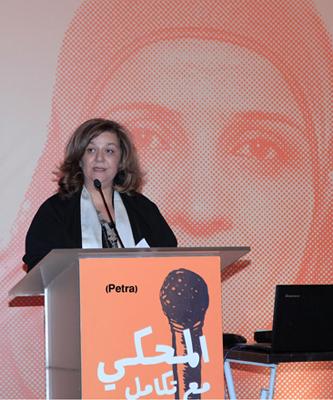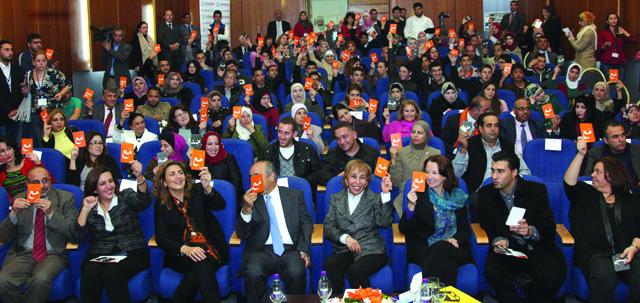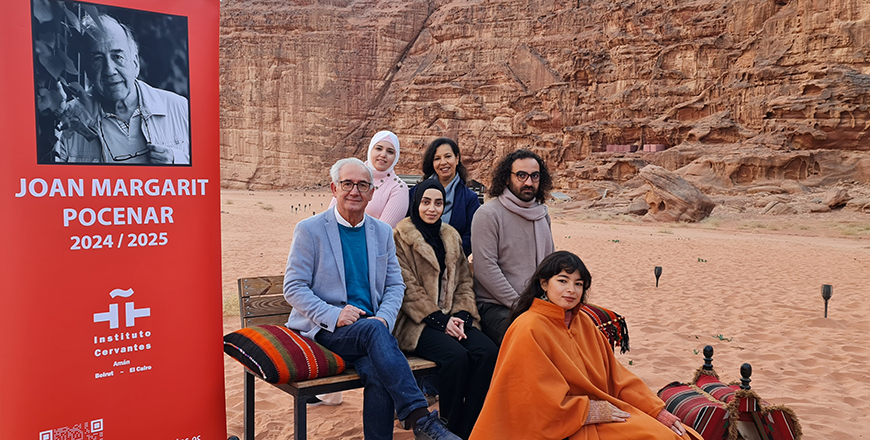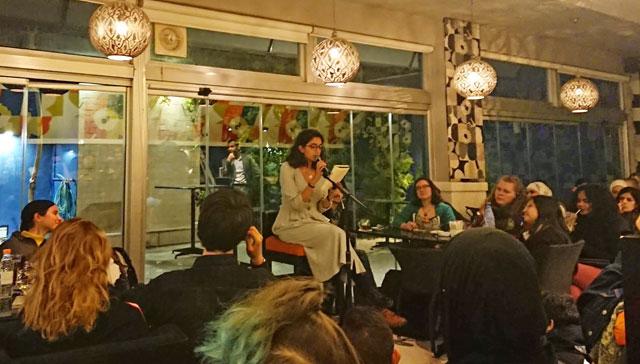You are here
Poetry slam gives young people a voice on social issues
By Dana Al Emam - Dec 10,2015 - Last updated at Dec 10,2015

USAID Takamol Chief of Party Nermeen Murad delivers a speech at a ceremony in Amman on Thursday marking the conclusion of the '16 Days of Activism Against Gender-Based Violence' campaign (Petra photo)
AMMAN — Seven young Jordanians employed verse in expressing their views on gender issues and advocating for social change in a poetry slam on Thursday.
Organised by the
USAID Takamol Gender Programme and marking the conclusion of the "16 Days of Activism Against Gender-Based Violence" campaign, the competition followed a six-week training programme for participants on style and content.
The spoken poetry initiative seeks to provide youths with creative tools to express what they can do regarding gender issues and other topics of interest, Takamol Chief of Party Nermeen Murad told The Jordan Times.
"The project encourages spoken poetry as a form of communication, especially as there is not enough social dialogue on gender-based violence issues," she noted, adding that the initiative will be taken to universities.
First place winner Abdulkarim Waqqad said he now has the motivation to build further on his interest in creating spoken poetry, which started two years ago.
The 16-year-old recited a poem depicting the socio-economic challenges facing young residents of underprivileged areas in east Amman.
"I will continue to write about such topics in my future compositions," the Takamol Poet 2015 told The Jordan Times.
Mohammad Sulaiman's poem discussing the binary of men's vs women's rights came second, while Nour Jaljouli's poem on how stereotypes form chains imprisoning girls since birth came third.
Another participant, Amira Shabaan, said she found in the workshop and the competition a "great chance for learning" that she hopes to build on.
The 19-year-old said it was difficult for her at the beginning to compose poetry about personal encounters with gender-based topics, a wall that the training encouraged her to break in order to share a more "genuine" experience with the audience.
Cartoonist Omar Abdallat, a member of the committee of judges, described the competition as a "very important and inspiring" experience that revealed the potential of young Jordanians in an under-appreciated field of art.
"It is the role of artists to move communities towards finding solutions for problems their societies face," he told The Jordan Times on the sidelines of the competition.
Spoken word artist, poet and writer Aysha Shamayleh, who trained participants in the competition, highlighted three components of the workshop that addressed three stages of the spoken word process: brainstorming and idea generation techniques, writing techniques and performance.
Shamayleh, who is the founder and CEO of WritersCell creative writing incubator, said participants' performances exceeded her expectations and registered "great" improvement over the course of the programme.
Amer Al Taher, a rap singer and composer who also trained the competitors, highlighted the power of a single line of poetry impregnated with meaning and emotion to affect the audience and encourage them to embrace change.
He cited the various backgrounds and personal experiences of participants as a challenge that the group was able to overcome through their shared passion for writing poetry.
The initiative was implemented in partnership with the Jordanian National Commission for Women, UN Women and the embassy of the Netherlands.
Related Articles
Gender-based violence leads to widespread social violence, which negatively affects the security and safety of the community, HRH Princess Basma said Tuesday.
AMMAN — The centrse of Instituto Cervantes in Amman, Beirut, and Cairo have recently held the first workshop of the Translation Programme Po
AMMAN — “From now on, my voice will be heard, and I start with this — my first spoken word.” The assertion comes from Sanaa Asim, concluding



















